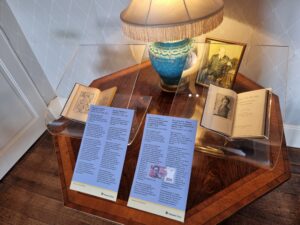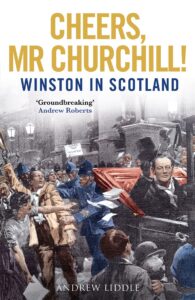Finest Hour 200
Action This Day – Summer 1897, 1922, 1947

August 19, 2024
Finest Hour 200, Fourth Quarter 2022
Page 44
By Michael McMenamin
125 Years Ago
Autumn 1897 • Age 23
“I Am Intended to Do Something in the World.”
With the coming of autumn, Churchill’s complaints of boredom in India ceased. While he had been fired upon without result during his 1895 excursion to Cuba, he had been there as an observer and a journalist, not as a soldier. Now, while still a journalist, he was also a soldier in the Malakand Field Force. Unlike his letters to his father, the young Churchill had always been remarkably candid in his letters to his mother. This did not change when he went into combat, although few mothers would want to receive from a son the type of letters Churchill sent Jennie during his adventures in the field. A sampling:
[5 September] As to fighting— we march tomorrow, and before a week is out, there will be a battle—probably the biggest yet fought on the frontier this year. By the time this reaches you, everything will be over so that I do not mind writing about it. I have faith in my star—that is that I am intended to do something in the world. If I am mistaken—what does it matter? My life has been a pleasant one and though I should regret to leave it—it would be a regret that perhaps I should never know.
[19 September] When the retirement began I remained till the last and here I was perhaps very near my end. If you read between the lines of my letter, you will see that this retirement was an awful rout in which the wounded were left to be cut up horribly by these wild beasts. I was close to both officers when they were hit almost simultaneously and fired my revolver at a man at 30 yards who tried to cut up poor Hughes’s body. He dropped, but came on again. A subaltern— Bethune by name and I carried a wounded Sepoy for some distance and might perhaps, had there been any gallery, have received some notice. My pants are still stained with the man’s blood.
[2 October] It is a war without quarter. They kill and mutilate everyone they catch and we do not hesitate to finish their wounded off. I have seen several things wh[ich] have not been very pretty since I have been up here … All this however you need not publish. If I get through alright—and I have faith in my luck—I shall try and come home next year for a couple of months. Meanwhile the game amuses me—dangerous though it is— and I shall stay as long as I can.
What was a mother to do? Whatever Jennie felt inside, she kept up a positive front in her letters to her son, this one from 21 September being typical: “There are so many things I want to talk to you about, but I am so in the dark as to your whereabouts or knowledge as to when this [is] likely to reach you that I find it difficult. You see I do not know how you have managed to get to the front, in what capacity? How you managed to get round your colonel is a mystery to me. Well! darling I can only hope for the best & pray that all will come out well. I believe in your lucky star as I do in mine.”
In fact, Jennie had come through for her adult son, as she invariably did, by persuading the Daily Telegraph to publish his letters, albeit at only £5 a column rather than the £10 for which Churchill had hoped. Unfortunately, Churchill’s published reports were unsigned. Jennie was responsible for this and tried to make the best of it in a letter to Winston of 7 October: “I wrote to the Prince [of Wales] & told him to look out for yr letters. Also to lots of people. You will get plenty of kudos (can’t spell it) I will see that you do darling boy…. Don’t be worried about your letters, you will be able to use them again in a pamphlet form—‘The Second Afghan Risings’ etc.”
But Winston was having none of it. He was out for publicity, and he chastised his mother for her decision to follow the advice of her friend Lord Minto, who had warned her that signed articles might get Churchill in trouble. “I will not conceal my disappointment at their not being signed,” he wrote on 25 October. “I had written them with the design, a design which took form as the correspondence advanced, of bringing my personality before the electorate. I had hoped that some political advantage might have accrued.”
100 Years Ago
Autumn 1922 • Age 48
“A Cherub Peace Maker”
Churchill’s appendix chose an inopportune time to flare up. He underwent an operation to remove the offending organ on 18 October. The next day, the Liberal-Conservative wartime coalition dissolved; Lloyd George resigned as Prime Minister; and a new General Election was scheduled for 15 November. Churchill, recovering from his surgery, was unable to travel north to his constituency in Dundee, Scotland until the last week of the campaign. In the interim, Clementine filled in by reading election statements that Churchill had dictated from his sick bed. On 10 November, he finally was able to campaign and took a sleeper train from London to Dundee.
Clementine does not receive enough credit as one of Churchill’s closest and most politically astute advisers. Before his journey to Dundee, she offered this advice based on her own experience on the campaign trail:
If you bring Sergeant Thompson, tell him to conceal himself as it would not do if the populace thought you were afraid of them. The papers are so vile they would misrepresent it. I f ind what the people like best is the settlement of the Irish question. So I trot that out & and also your share in giving the Boers self-government. The idea against you seems to be that you are a “War Monger”, but I am exhibiting you as a Cherub Peace Maker with little fluffy wings around your chubby face.
Two seats were at stake in Dundee. Churchill finished fourth. The Conservative Party won the election with 354 seats. Labour finished second with 142. A week after the election, a friend who dined with Churchill thought he “was so down in the dumps that he could scarcely speak the whole evening. He thought his world had come to an end—at least his political world. I thought his career was over.”
75 Years Ago
Autumn 1947 • Age 73
“I Think You Give Me Too Much Credit”
In late September, while working on his memoirs, Churchill gave a mutual friend a hand-written letter to deliver to President Harry Truman: “I cannot resist sending by hand a few lines to tell you how much I admire the policy when you have guided your great country; and to thank you from the bottom of my heart for all you are doing to save the world from Famine and War….You have my warmest good wishes in yr memorable discharge of yr tremendous office, and you can be sure that all the strongest forces in Britain are & will be at your side if trouble comes.”
Truman replied, also in a hand-written letter: “Your Fulton speech becomes more nearly a prophecy every day. I hope conditions will warrant your paying us another visit. I certainly enjoyed your stay here immensely. You are very kind to me, and I think you give me too much credit. But I like it— particularly from you. May you continue to enjoy health and happiness and a long life—the world needs you now as badly as ever.”
Speaking at the Annual Conference of the Conservative Party in Brighton on 4 October, Churchill warned the party to be ready for an election at any time: “In the present circumstances, when the consequences of Socialist spite, folly and blundering are about to fall upon every home and business in ever sharper forms, we can safely say that time is on our side. It does not rest with us when a General Election will take place; but it is quite certain that we should be most imprudent not to be ready for one at any time this year or next.”
Subscribe
WANT MORE?
Get the Churchill Bulletin delivered to your inbox once a month.






